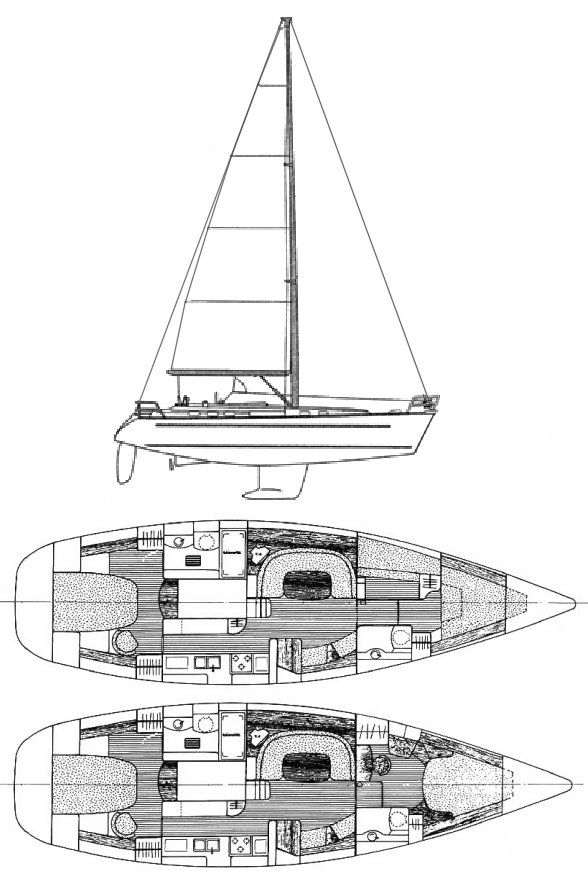The Beneteau Oceanis 44 CC, launched in 1994, emerged as a dedicated cruising sailboat, epitomizing comfort and robust construction for extended life aboard. Conceived for private owners desiring expansive living spaces and ease of handling on long passages, this center-cockpit yacht synthesizes Beneteau's renowned build quality with designs from leading naval architects. She is a testament to the French builder's commitment to producing capable and accommodating cruising platforms, establishing a strong reputation within the sailing community for her liveability and solid performance as a true blue-water contender.
Oceanis 44 CC (Beneteau) Information, Review, Specs

- Make
- Beneteau
- Model
- Oceanis 44 CC
- Number Built
- Production Year(s)
- 1994 - ??
History and Design
The creation of the Oceanis 44 CC in 1994 saw Beneteau, a company with a rich heritage tracing back to 1884, collaborate with the acclaimed naval architect Bruce Farr for her hull design, while Armel Briand was responsible for the interior. This partnership aligned with Beneteau's long-standing practice of engaging top design talent to ensure their yachts remained contemporary and well-suited to evolving sailor demands. During this era, Beneteau was firmly established in fiberglass construction, a revolution spearheaded by Benjamin Bénéteau's grandsons in the 1960s, allowing for efficient production and broader market appeal. The Oceanis 44 CC specifically aimed to provide a comfortable and safe platform for unconstrained cruising. While the production end year is not specified, models were built into the early 2000s, indicating a healthy production run for this popular design. No significant variations like "MkI" or "MkII" are commonly cited, suggesting a consistent design throughout its production.
Sailing Performance and Handling
The Beneteau Oceanis 44 CC is not designed as a high-performance racer, but rather delivers steady and respectable performance well-suited for a cruiser of her size and displacement. With a calculated sail area to displacement ratio of approximately 14.64, she indicates a design focused more on comfortable cruising than light-air agility, suggesting she requires a fair bit of wind to truly come alive. Her ballast to displacement ratio, around 0.29, points towards a design prioritizing a comfortable motion through a seaway over ultimate stiffness, which is characteristic of many dedicated cruising yachts. Furthermore, a displacement to length ratio of approximately 210 signifies a moderate displacement vessel, striking a balance between weight for stability and manageable performance. Owners generally describe her as a comfortable and safe vessel with well-balanced sail performance, capable of undertaking extended cruises. She is known for handling predictably in various sea states, offering a reassuring ride even when conditions become less favorable.
Accommodations and Layout
A defining characteristic of the Beneteau Oceanis 44 CC is its center cockpit configuration, which allows for an exceptionally spacious and voluminous aft owner's cabin. This master suite is consistently praised by owners for being "huge" and offering "ample space and private" facilities, including a decent-sized hip bath within the en-suite heads compartment. The interior layout typically features a well-appointed salon, a functional galley, and a forward cabin, often with its own head, providing comfortable accommodations for guests. The general finish quality is in line with Beneteau's standard for cruising yachts of the era, combining practical fiberglass surfaces with warm wood trim. Storage throughout the boat is generous, catering to the needs of long-term liveaboards and cruisers. The design incorporates effective ventilation, essential for comfort in various climates. The relatively high freeboard, subtly disguised by a wide teak rub strake, contributes to the impressive interior volume.
Owner's Perspectives
Owners of the Beneteau Oceanis 44 CC generally express high satisfaction with their vessels, frequently praising the yacht's solid construction and its comfortable, stable motion while underway. The expansive aft owner's cabin is a consistent highlight, providing a private and luxurious retreat. Many owners consider it an ideal platform for extended cruising and even circumnavigation, attesting to its seaworthiness and liveability. While specific common problems are not widely reported, the Beneteau Oceanis CC range, in general, has garnered a reputation for reliability, with few reported issues. Owners often form strong communities, sharing experiences and insights, further enhancing the ownership experience.
Measurements
Construction & Hull
- Construction Material
- Fiberglass (Solid)
- Hull Type
- Monohull Sailboat
- Keel Type
- Bulb
- Rudder
- 1x Spade
- Ballast
- 6835 lbs
- Displacement
- 23369 lbs
- Water Capacity
- 163 gal
- Fuel Capacity
- 95 gal
Engine
- Engine Make
- Volvo Penta
- Engine Model
- —
- Engine Type
- —
- Engine HP
- —
- Engine Count
- 1
- Drive Type
- —
- Fuel Type
- Diesel
Rig & Sails
- Rig Type
- Masthead Sloop
- P (Main Luff)
- 42.39 ft
- E (Main Foot)
- 16.31 ft
- I (Foretriangle Height)
- 46.13 ft
- J (Foretriangle Base)
- 17.55 ft
- Forestay Length (est)
- 49.36 ft
- Main Sail Area
- 345.69 sqft
- Foretriangle Sail Area
- 404.79 sqft
- Total Sail Area (Reported)
- 750 sqft
- Total Sail Area (Calc)
- 750.48 sqft
Dimensions
- LOA
- 44.58 ft
- LWL
- 36.75 ft
- Beam
- 14 ft
- Draft
- 5.75 ft
- Max Headroom
- -
- Air Draft
- -
Calculations
- Hull Speed
- 8.12 kn
- Pounds per Inch Immersion
- 1